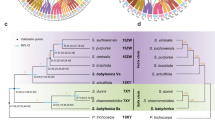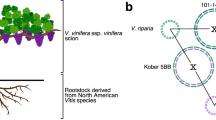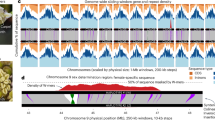Abstract
THE genus Marsilea has not previously been investigated by modern cytological methods, and we have only the early investigations of Strasburger1 and de Litardiere2 using techniques which experience has shown3 to be unreliable when applied to ferns. It is therefore perhaps of importance to record a clear count of n = 20 (see Fig. 1) for a race of Marsilea minuta from northern India. We believe this to be a diploid and have found 2n = 40 in squashes of root tips. Other cytotypes are, however, also present in this species, notably a sterile triploid with 2n = 60, which reproduces vegetatively but which is otherwise very like the diploid and frequently intermixed with it. Further observations on this material will be published elsewhere.
This is a preview of subscription content, access via your institution
Access options
Subscribe to this journal
Receive 51 print issues and online access
$199.00 per year
only $3.90 per issue
Buy this article
- Purchase on SpringerLink
- Instant access to full article PDF
Prices may be subject to local taxes which are calculated during checkout
Similar content being viewed by others
References
Strasburger, E., Flora, 97, 123 (1907).
Litardiere, R. de, La Cellule, 31, 255 (1921).
Manton, I., “Problems of Cytology and Evolution in the Pteridophyta” (Cambridge Univ. Press, 1950).
Author information
Authors and Affiliations
Rights and permissions
About this article
Cite this article
MEHRA, P., LOYAL, D. Chromosome Number of Marsilea . Nature 181, 577 (1958). https://doi.org/10.1038/181577b0
Issue Date:
DOI: https://doi.org/10.1038/181577b0



